Awards and Grants
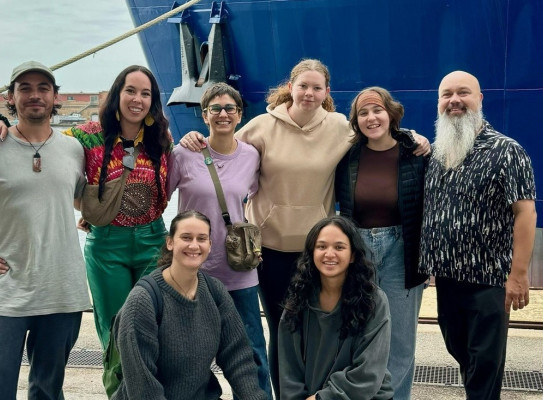

2024 ANZIC Marine Geoscience Masterclass
ANZIC and GeoDiscoveryNZ were thrilled to support three outstanding undergraduate students from Aotearoa New Zealand member universities in attending the ANZIC Marine Geoscience Masterclass in South-East Queensland from 2–13 December 2024. Rāwinia Wikaira (University of Otago Ōtākou Whakaihu Waka), Hannah Clark (Te Herenga Waka—Victoria University of Wellington), and Jack Crichton (University of Auckland Waipapa Taumata Rau) embarked on an unforgettable 12-day hands-on journey into the fascinating world of ocean science. Read on for their reflections on this incredible experience:
Tēnā tātou!
Tēnei te mihi ki a ANZIC mō te tiripi nei. “Ki uta, ki tai” he whakataukī matua o tēnei kaupapa māku. E ai ki ngā kōrero nō ngā tangata whenua, ka ora te wai, ka ora te whenua. Ka ora te whenua, ka ora te tangata. Rite tonu rātou ki te iwi Māori.
As someone passionate about marine science and the future of our planet, particularly from an indigenous lens, I was stoked to be accepted into the ANZIC Marine Geoscience Masterclass.
The first week was based in Brisbane where we were hosted by The University of Queensland and QUT (Queensland University of Technology) with a series of lectures and workshops which delved into geochemistry, geophysical modelling, micropaleontology and more.
The second week was a field trip to the University of Queensland’s Heron Island Research Centre where we did reef walks, snorkelling, surveys, explored a range of tropical carbonate ecosystems, unravelled geomicrobiology secrets and had enlightening talks linking the modern reef system to recent Integrated Ocean Drilling Program (IODP) expeditions.
We learned so much in such a short amount of time, and I am really grateful to have been selected to represent Ōtākou Whakaihu Waka (University of Otago) for this experience. My key highlights were how AI is being trained to help with the identification of microfossils under the microscope, the welcome to country by tangata whenua, mana whenua, video calling the Chikyu (a deep-sea sediment coring vessel - similar to the JODIES Resolution, which I was on earlier this year), understanding the evolution of the environment over many, many years, and exploring organisms living in extreme environments.
Overall, it was great to get a taste of working alongside multiple disciplines. It is important to have diverse perspectives and to work with different groups to understand the whole picture.
Big thank you to ANZIC, The University of Queensland, QUT (Queensland University of Technology), University of Otago, Chris Hepburn Hepburn, Katja Schweikert, Stuart Henrys, Luke Nothdurft, Helen Bostock Lyman, Gregory Webb, Annie Lau, Zsanett Szilagyi, Catherine K., Molly Husdell, Michele Elmes, and all the guest lecturers and participants.
Rāwinia Wikaira (The University of Otago Ōtākou Whakaihu Waka)
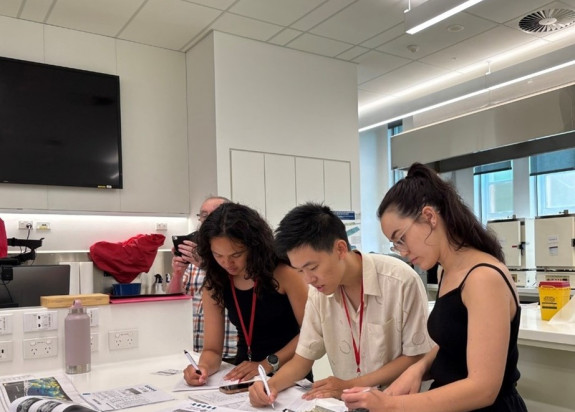
I am very grateful to have participated in the ANZIC Marine Geoscience Masterclass of December 2024, representing Victoria University of Wellington in Queensland. This course gave me new insight into the marine geoscience work being done by the University of Queensland, Queensland University of Technology, and other IODP researchers.
We spent our first week at the University of Queensland and Queensland University of Technology, learning all about marine organisms, geohazards, plate tectonics, and sedimentary records, through a series of lectures and hands-on labs. In the labs, we practiced sedimentary core logging, microscopy, and plate motion reconstruction. It was interesting to hear lectures from researchers including Assoc. Prof. Lorna Strachan, Dr Stuart Henrys, and Dr Ron Hackney about their recent IODP work, and I was particularly inspired by the New Zealand lens used to look at geohazards and its relevance to other areas.
Our second week took place at Heron Island Research Station on the Great Barrier Reef with Assoc. Prof Helen Bostok, Prof. Greg Webb, and a team of demonstrators. The learning was hands-on, and a combination of reef walks, snorkelling, and lecture-labs further developed my understanding of oceanography and past and present coral reef systems. It was also amazing to see all the marine life that we don’t have in New Zealand, especially the turtles that came in to nest on the beach every evening.
This trip challenged me to step outside my comfort zone, and I met some amazing peers and mentors who made this experience one to remember.
Huge thank you to ANZIC and Victoria University of Wellington for this opportunity, and a special thanks to Assoc. Prof. Helen Bostok, Dr Luke Nothdurft, Prof. Greg Webb, Dr Stuart Henrys, Assoc. Prof. Lorna Strachan, and everyone else involved in making this masterclass happen.
Hannah Clark (Te Herenga Waka—Victoria University of Wellington)
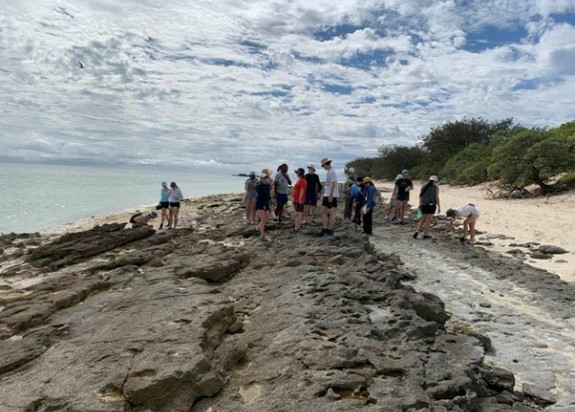
In December 2024, I was lucky enough to travel to Queensland, Australia to participate in the ANZIC Marine Geoscience Masterclass. Hosted by The University of Queensland (UQ) and Queensland University of Technology (QUT), this incredible opportunity brought together 22 students from across Australia and New Zealand, along with Japan, Papua New Guinea, and the USA, for a deep-dive into modern reef systems and ocean drilling.
During the first week, we were based in Brisbane and attended lectures, tutorials, and workshops at both UQ and QUT, looking at everything from deep ocean sediment cores and micropaleontology to volcanic rocks and tectonic plate reconstructions. One of the standout hands-on experiences for me was getting to see how sediment cores are first cut open and then prepared for analysis and logging.
For the second week, we travelled north to The University of Queensland’s research station on beautiful Heron Island. Here, we took part in reef walks looking at diverse coral ecosystems, snorkelling with turtles, rays, and reef sharks, and further expanded our understanding of the geology, evolution, and biology of the Great Barrier Reef through engaging lab work. To be able to relate our knowledge to the real world and experience it first-hand was invaluable.
Throughout the trip, I thoroughly enjoyed being fully immersed in the scientific environment whilst spending time with like-minded individuals. One of the most impactful aspects of this experience was getting to meet so many amazing and knowledgeable people, from international researchers and lecturers to new friends and future colleagues. I am incredibly grateful to have had this unique opportunity and look forward to continuing to be a part of the geoscience community.
Jack Crichton (The University of Auckland Waipapa Taumata Rau)
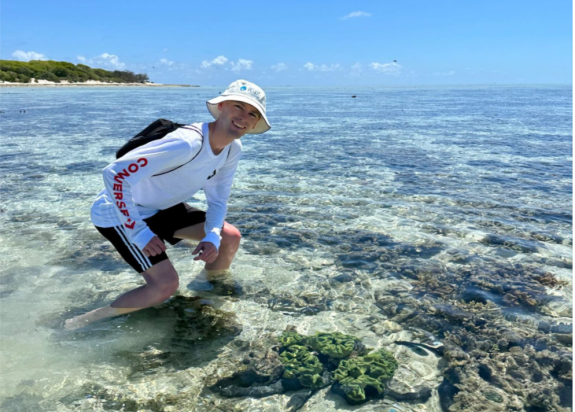
2024 GeoDiscoveryNZ and ANZIC Continent and Ocean Research & Education (CORE) Funding awarded.
The GeoDiscoveryNZ and ANZIC Continent and Ocean Research & Education (CORE) Funding programme provides grants for projects designed to exploit the wealth of samples, data and data products generated through 50+ years of ocean and continental drilling. The grants are aimed at supporting the cost of sample processing and data analysis. This year, GeoDiscoveryNZ and ANZIC announce four exciting CORE grants within Aotearoa New Zealand:
Greer Gilmer (GNS Science), Kate Clark (GNS Science), Lorna Strachan (University of Auckland); Chris Rollins (GNS Science); Marcus Vandergoes (GNS Science): Do Fiordland (NZ) sediment cores contain an untapped record of past earthquakes?
Sediment cores from Fiordland’s fjord basins show considerable potential as continuous records of past earthquakes. By examining whether these cores capture significant seismic events, such as the 2003 (M7.2) and 2009 (M7.8) earthquakes, Greer and the research team aim to evaluate the effectiveness of sediment cores as paleoearthquake archives, essential for refining hazard predictions. Through precise dating techniques on existing cores, the team will analyse sedimentary signatures of event deposits to determine their connections to documented earthquakes. This pilot study serves as a foundational step for the Fiordland Assessment of Climate, Environment, and Tectonics (FACET) ICDP project.

Catherine Ginnane (GNS Science), Jocelyn Turnbull (GNS Science), Sebastian Naeher (GNS Science), Greer Gilmer (GNS Science), Jess Hillman (NIWA), Scott Nodder (NIWA), Christian Lewis (GNS Science), Marcus Vandergoes (GNS Science): Exploring the long-term fate of organic carbon exported from New Zealand fjords.
Despite the importance of fjords in global carbon sequestration, the fate of terrestrial carbon within these systems remains poorly understood. Catherine and colleagues will expand the characterization of sequestered organic carbon from New Zealand fjords to offshore sediments to determine the fate of carbon exported to the ocean. By employing advanced radiocarbon and geochemical methods, the team will trace carbon from its terrestrial sources through fjords to its eventual export and burial offshore. The research aims to reveal potential carbon budget implications of fjord carbon sequestration processes.

Lorna Strachan (University of Auckland), Helen Bostock (U. of Queensland), Martin Crundwell (GNS Science), Margaret Norris (GNS Science), Morgane Brunet (Université du Québec à Rimouski): Has the Hikurangi Subduction Margin undergone profound changes in accelerated Pacific Plate subduction during the last 1M years?
Lorna’s project aims to test the hypothesis that the Hikurangi Subduction Margin has experienced significant changes in the rate of Pacific Plate subduction over the past 1 million years. Utilizing data from the International Ocean Discovery Program (IODP) Expeditions 372 and 375, the project team will develop a novel transect across the subduction margin, combining high-resolution sedimentological and oxygen-isotope analyses. This approach will create a comprehensive set of multiproxy age models and depositional facies schemes, providing the framework needed to evaluate the proposed changes in subduction dynamics.
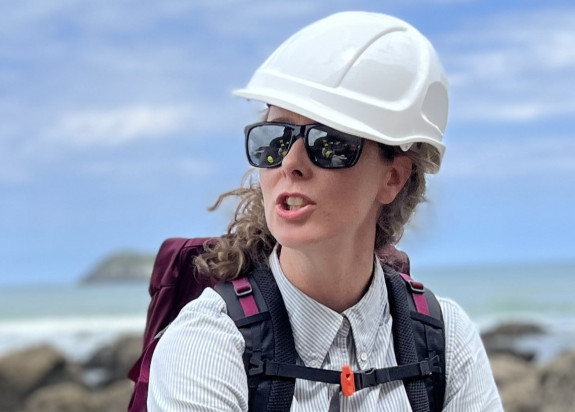
Jess Hillman (NIWA), Sally Watson (NIWA), Joseph Prebble, Kyle Bland, Te Aomania Te Koha (GNS Science): Unboxing the Ocean: a hands-on bathymetry exploration kit.
Jess and the project team aim to enhance ocean science literacy across diverse audiences by creating accessible, portable, hands-on resources. These activities will introduce basic principles of seafloor mapping, highlighting the unique challenges of marine exploration. Dual-language materials will explain core marine geoscience concepts, including seafloor and water sampling, subseafloor profiling techniques and their research applications. Additionally, these resources will showcase recent scientific drilling expeditions around Aotearoa, Australia, and Antarctica, using real-world data and examples to bring scientific concepts to life.
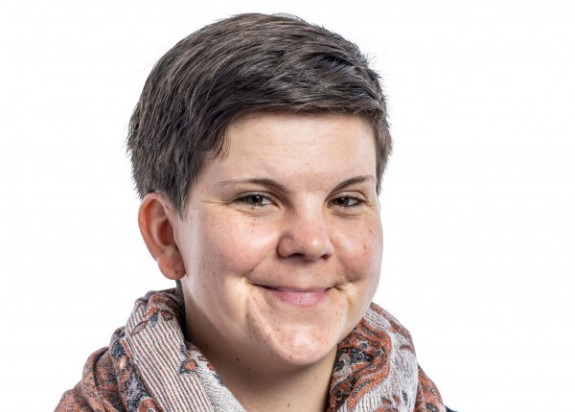
Summer Schools participation
GeoDiscoveryNZ & ANZIC support tertiary students from member universities in participating in Summer Schools focusing on ocean and continental scientific drilling research. The Summer Schools offer unique in-depth opportunities for students to build up their knowledge, experience and academic networks.
2024 ECORD Urbino Summer School in Paleoclimatology
In July, I had the privilege of attending the Urbino Summer School for Paleoclimatology in Urbino, Italy. The course combined lectures, practical sessions, and a field day covering all aspects of paleoclimatology, with this year’s focus specifically on climate modelling. I presented a poster on my PhD research, titled “Investigating the Role of Orbital Forcing on Antarctic Ice Sheet-Ocean Dynamics during the Miocene.”
The course gave me a solid foundation in paleoclimatology methods, deepening my understanding of how the data I work with is collected. Attending this summer school was a fantastic opportunity to connect with researchers whose work I've often read and to gain insight into their specialties. Coming from a background in geology and geophysics, it was invaluable to engage with experts from diverse fields and perspectives. I am very grateful to GeoDiscoveryNZ and ANZIC for enabling me to attend the Summer School - Julianne Burns (Te Herenga Waka VUW)
2024 GLAcial Sediment School (GLASS)
"With support from ANZIC and GeoDiscoveryNZ, I attended the GLAcial Sediment School (GLASS) in College Station, USA, from July 14-19, 2024, to enhance my knowledge of glacial sedimentation processes. Researchers, lab technicians, and tutors provided lectures to the School, and assigned each of us a polar sediment core to analyze. This hands-on learning approach was invaluable, allowing me to connect with fellow participants and gain insight into their research methods. The program encouraged meaningful discussions and motivated me daily. Studying deep-sea sediment cores, alongside my experience with Ross Ice Shelf sediments, has greatly enriched my PhD research and broadened my understanding of global sedimentation processes." - Linda Balfoort (Victoria University of Wellington)
2024 ECORD Summer School: Downhole Logging
"My sincere thanks to GeoDiscoveryNZ, in association with ANZIC, for the support so that I had the privilege of attending the 2024 ECORD Summer School: Downhole Logging for IODP Science at the University of Leicester, from July 27 to August 2, 2024. The 2024 ECORD Summer School was an enriching experience that deepened my understanding of downhole logging and its applications in marine geosciences. The combination of academic content, practical exercises, and networking opportunities has contributed significantly to my professional growth and has paved the way for my future career in marine geosciences, particularly in participating in future IODP expeditions. I am excited to see how this experience will shape my journey ahead!" - Hanifah Dina (University of Auckland)
JR Academy
ANZIC, in collaboration with the International Ocean Discovery Program's U.S. Science Support Program, is supporting three mentors and five students from Australia and Aotearoa New Zealand to join other indigenous peoples from America to participate in the 2024 JR Academy – Fire to flood.
The JR Academy, aboard the JOIDES Resolution, will be a transformative and exciting experience, bridging the gaps between Western and Indigenous sciences, benefiting First Nations Peoples. Participants will get the opportunity to grow their STEM skills, build networks, and contribute to international knowledge exchange.
The expedition will take place between the 10th and 25th of April 2024, during the JOIDES Resolution transition from Naples, Italy to Amsterdam, the Netherlands. Students and mentors will immerse themselves in a rich tapestry of Earth and ocean science activities, complemented by hands-on experiences in science communication and career development.
GeoDiscoveryNZ and ANZIC are proud to support one mentor and two students from Aotearoa New Zealand: Jesse-James Pickery (in association with “Out There Leaning”), as the mentor position, and Pianina Kahui-McConnell (AUT/NIWA intern) and Rāwinia Wikaira (University of Otago) as the successful student placements.
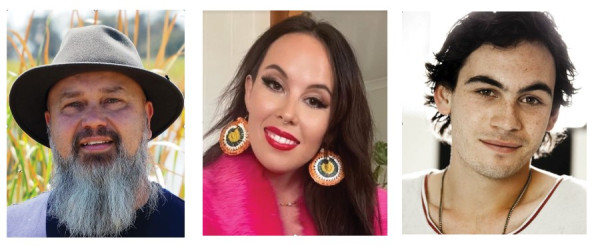
Assoc. Prof. Brad Moggridge, Kamilaroi water scientist at the University of Canberra. Brad's achievements include extensive collaboration with Indigenous groups across Australia and New Zealand for an IPCC Report. He plans to write a paper with the mentors about the outcomes of the JR Academy.
Ann-Maree June Long, an expert in supporting Indigenous students in academia, whose proposed outreach activity, 'my story', promises to be engaging and unique.
Jesse-James Rehu Pickery, until recently with GNS Science, coordinated the design of the GeoDiscoveryNZ logo. He plans to use geological time to bridge Mātauranga Māori and Western Science.
GeoDiscoveryNZ, a consortium of Crown Research Institutes and Universities, advances scientific drilling in pursuit of discovery and exploration. GeoDiscoveryNZ advocates for strengthened national and international collaborations to advance knowledge of our land and seas to understand Earth System processes in our region.
“We are absolutely committed to growing capability and excited to provide opportunities for Māori participation”, says Stuart Henrys, Chair of GeoDiscoveryNZ.
You can keep up with the JR Academy on the IODP Facebook(external link) and Instagram(external link) channels, as well as on AuScope(external link).